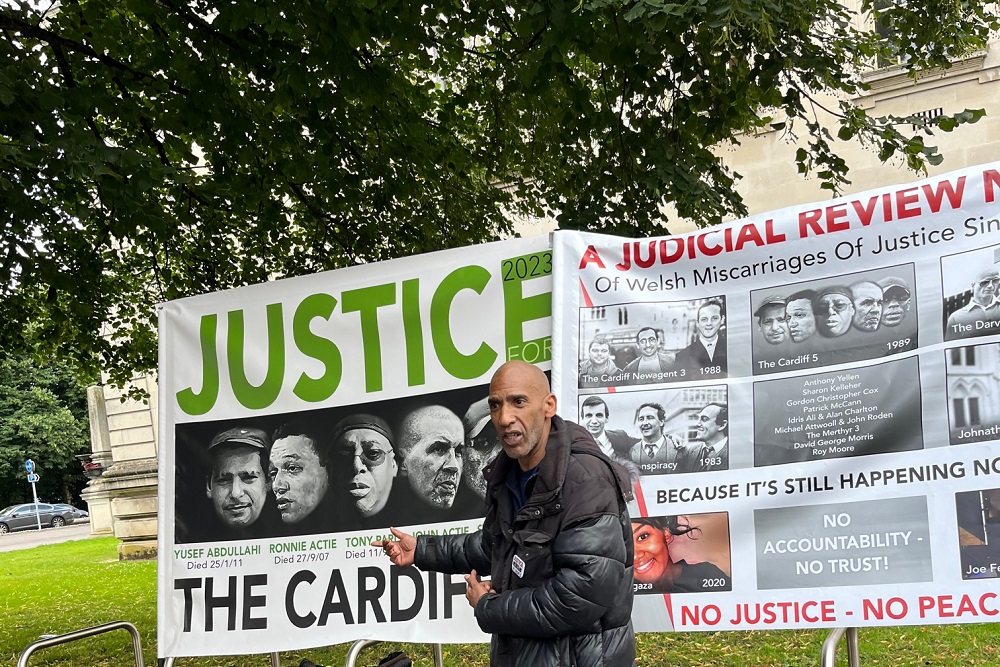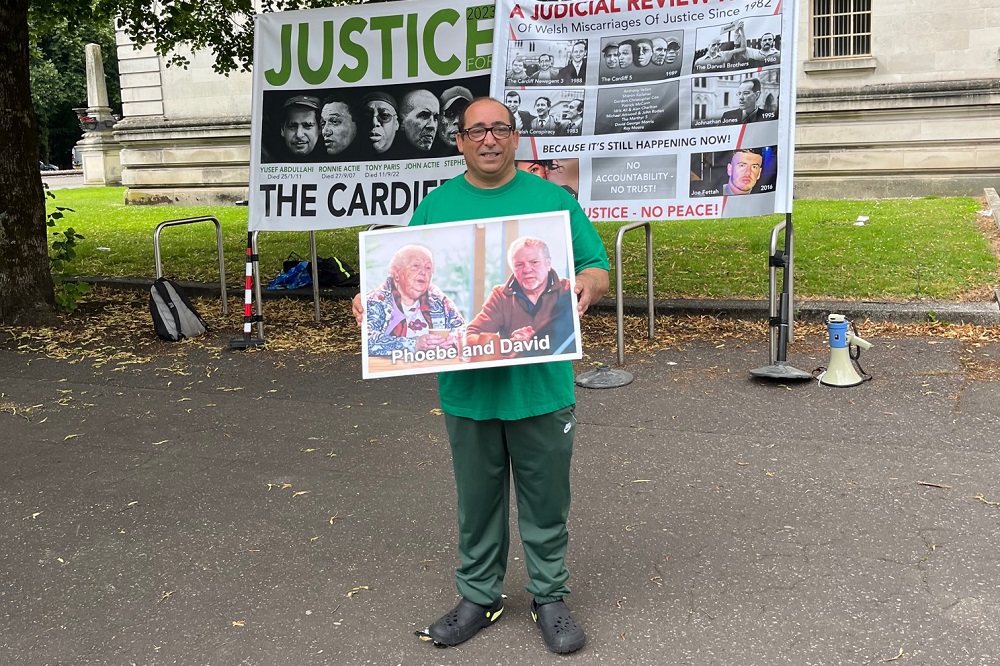Miscarriage of justice victims left traumatised

Martin Shipton
A series of miscarriages of justice in the South Wales Police area has left many victims traumatised and underlines the need for a judicial inquiry, according to a veteran campaigner who has been involved with the infamous Cardiff Five case for more than 30 years.
Kervin Julien made a passionate speech at a rally outside Cardiff Crown Court in support of a campaign for such an inquiry into why there have been multiple examples of people being wrongly convicted.
Five black men were put on trial for the 1988 murder of sex worker Lynette White, 20, in Cardiff’s multiracial Butetown district. Three were found guilty and jailed for life, but their convictions were later quashed by the Court of Appeal after disturbing evidence emerged about serious irregularities in the way the police conducted the murder investigation.
Years later the real killer, a white man called Jeffrey Gafoor, was identified following advances in DNA technology. He was convicted of murder, sentenced to life imprisonment and remains a prisoner.
The rally was organised by Michael O’Brien, who with two co-defendants unjustly spent 11 years in prison for the murder of Cardiff newsagent Phillip Saunders in 1987. Their convictions were also quashed following revelations about police misconduct during the investigation.

Mr Julien told the rally, which took place on the 35th anniversary of the wrongful convictions of Mr O’Brien and his co-accused Darren Hall and Ellis Sherwood: “It’s been 35 years since Lynette White was murdered. It’s been 33 years since the three boys {Yusef Abdullahi, Stephen Miller and Tony Paris] were convicted. One thing I feel strongly about is where is the outrage? Where is the outrage over what some people refer to as the most expensive murder trial and the worst miscarriage of justice in UK history?
“Since Jeffrey Gafoor confessed, was charged and convicted, we still have had no justice. Going back to the original trial, and then the appeal in 1992, the boys were denied justice. The appeal was halted on a technicality relating to the unlawful interview techniques used on Stephen Miller. But had the trial also continued onto the evidence of the other boys also involved, they would have exposed a much deeper corruption, deeper coercion. They would have exposed more lies, and there would have been fewer questions left unanswered.
“Let’s fast forward to the trial of the police officers [who had been charged with perverting the course of justice], many years later. Once again the boys were denied justice, because that trial was also halted on a technicality, with documents that apparently went missing. A junior doctor stood on the stand and said they were told to shred those documents, which then turned up after the trial was halted. I have it on good authority that the documents that went missing were really insignificant to the trial. Had the trial continued, once again more evidence would have been exposed about the corruption, the coercion, the lies and everything else.”
No accountability
Mr Julien said there had been 35 years with no answers and no accountability – and without accountability there’s no trust and no change. And if there’s no change, how do we know that our children are going to be safe on the streets of Cardiff in years to come? How are we going to know that they’ve implemented changes and policies that the police will have to follow in order that our children, our grandchildren, will be safe when they’re arrested on the streets of Cardiff?
“I want to see outrage. I want to see numbers coming forward and saying, ‘we want accountability’. Accountability doesn’t start with sacking 30 or 40 police officers. It starts at the top, where the policies and principles are laid down for those officers who are coming into the force to follow. And if you don’t change the mentality, the cultural awareness and the whole attitude of people at the top who are running South Wales Police, then you’ve got the same type of police officers coming in as those who were operating back in 1988. We need change, and without accountability there will be no change.
“This is not a campaign to get the guys free. They’ve been released. This is not a campaign about raising money for compensation. That’s been done. This is a campaign to raise awareness that we need accountability for everyone who has been wrongly convicted and those who are yet to come.”
Mr Julien said there was a desperate need for police officers to re-engage with the communities they serve and build trust: “Where’s that guy who could engage with the community? Where’s that guy who could communicate with the community? Where are those officers coming from?
“Police officers are now being recruited who have no attachment to the communities that they’re going into. They’re coming with a provocative, aggressive attitude. That starts with the principles and policies that come from the top.”
Mental trauma
He said one of the things that often wasn’t talked about was the mental trauma that people went through when their family members were murdered or if they were wrongly accused of a crime they hadn’t committed.
“On February 14 1988 a young girl was absolutely mutilated in a horrendous, hideous murder by any standards whatsoever. Nobody is discounting the trauma that her family went through, knowing that’s how their daughter ended her life.
“The five boys who eventually were arrested for the crime may have been aware of each other, but they weren’t friends – they didn’t hang out with each other. They didn’t go to clubs together, they didn’t go to pubs together, they didn’t sit in each other’s houses and drink beer together and do that kind of stuff – they weren’t associated in that way. So questions have to be asked about how the police managed to frame these five people and accuse them of committing the murder we’re talking about.
“The trauma that these guys were left with was indescribable.
“I knew Yusef. He had 11 witnesses to say he was working away somewhere else, over 12 miles away from where the murder took place.In fact he had more witnesses to prove his innocence than the police could find to try and prove his guilt – but they were ignored. He died a very isolated, miserable man. Isolated, hermitised, not going out of his home. That’s the trauma.
“Ronnie Actie [who was acquitted of the murder] died in a shed at the end of his garden, never leaving his home, absolutely traumatised from the experience.
“Tony Paris died recently. Hermitised, traumatised. All of them on medication of one sort or another. Stephen Miller is still alive. He’s traumatised and finds it very difficult to associate with or trust anybody.
John Actie [also acquitted at the trial] – traumatised, on medication, living a very simple existence but still fighting for the campaign.
“The funny thing is that when [the police] went into that community, they didn’t just put those five men on trial. It was the whole community that was impacted and affected.
“In all of these cases that we’re talking about today, these people are living in trauma. When you are convicted or accused of a crime so hideous that it actually turns your stomach, there’s no telling how people are going to treat you in prison.
“There’s no understanding of how people are going to look at you in prison. If you go into prison for something like that, they isolate you, they put you in solitary. You don’t know when someone’s going to throw a cup of water over your face or spike you or scar you or attack you in your cell when nobody’s looking. The screws even join in and open up the cells so they can get at you. That’s the type of fear and anxiety that they live with while they are trying to serve their sentence and prove their innocence.
“But these guys, when they went to prison, almost everybody knew they were innocent.And that speaks volumes. The community knew that they were innocent. That speaks volumes.
“Yet the trauma has left five families absolutely dilapidated, the community in absolute ruin, and they’re left with a country that they can no longer trust. That’s what we’re left with. We need an inquiry.”
South Wales Police has acknowledged past failings but insists its culture has changed greatly for the better.
Support our Nation today
For the price of a cup of coffee a month you can help us create an independent, not-for-profit, national news service for the people of Wales, by the people of Wales.





“South Wales Police has acknowledged past failings but insists its culture has changed greatly for the better.” even though the way they conduct themselves in the present day is no different than how they conducted themselves in the past. The police, need to be completely disbanded and a new collective of state-employed representatives able to ensure law and order is maintained and that it applies evenly to all and free from prejudices created, with one of the important rules for the new officers of this modern law-keeping force being that anyone who was part of the police we have now… Read more »
South Wales police officers if you can’t PROVE someone committed a crime DON’T arrest them It’s not difficult!
We should scrap South Wales Police and name the new Constabulary, what it actually is, Glamorgan Police. The few good eggs should be used to provide experience, training and mentoring to new police officers, while the rest of the old ones get no pensions, no acknowledgement and, if necessary, prosecuted for wrongful arrests, falsifying evidence and wrongful imprisonment.